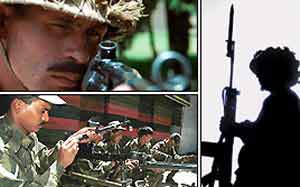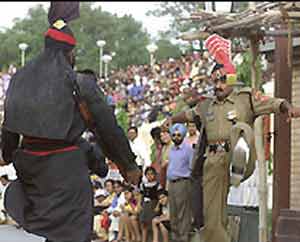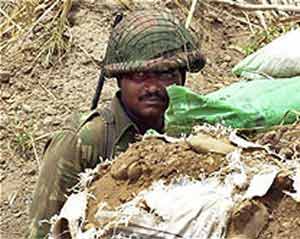| Witnesses described a big fire at the
crash scene. Military officials have secured the area, a Pakistani official
said.
India has not yet commented on the incident,
but a Pakistani government spokesman called it the latest example of India's
"complete disregard" for "international norms."
Fears of war
India and Pakistan have massed about a
million troops along their border and the Kashmiri Line of Control, which
divides the disputed region between them, since a December raid on India's
parliament. (Maps and military)
India has accused Pakistan of funding,
arming and training Islamic militant groups and has blamed the attack on
India's parliament, as well as a series of other raids in Indian-administered
Kashmir, on them.(A tense few weeks)
Pakistan has denied the Indian charges
saying it only gives moral support to groups waging what it calls a "liberation
struggle" for the people of Kashmir.
The stand-off has sparked global fears
of a possible nuclear war developing over the Himalayan flashpoint, which
has already sparked two wars between Pakistan and India.(Kashmir history)
On Friday, top U.S. envoy Richard Armitage
said tensions between the two nations seemed to have eased a little, but
said it was too soon to rule out the threat of a war over Kashmir.
"Tensions are a little bit down," Deputy
Secretary of State Richard Armitage told reporters after meeting with Prime
Minister Atal Bihari Vajpayee in the Indian capital.
Armitage's visit is the latest in a concerted
international effort, by countries including Russia, China and the United
Kingdom, to defuse tensions in the region.
Armitage held talks with Pakistani President
Gen. Pervez Musharraf in Islamabad, Thursday on the first stop of his mission
to try to defuse the potential conflict on the subcontinent. Musharraf
assured him Pakistan would not start a war.

|
Risks of war
Armitage's mission will be followed up
by a trip next week by U.S. Defense Secretary Donald Rumsfeld, who is expected
to spell out bluntly to both sides the risks entailed of a war.
Rumsfeld and Armitage are due to meet in
Estonia on Saturday to discuss strategy for Rumsfeld's trip to the Asian
subcontinent, according to a senior U.S. official |
U.S. President George W. Bush and Russian
President Vladimir Putin spoke on the phone Thursday, where the two "agreed
to continue mutual efforts to de-escalate tensions between India and Pakistan,"
White House Press Secretary Ari Fleischer said in a statement.
Japan, meanwhile, says it will charter
a commercial plane soon to help to evacuate Japanese nationals from India.
The aircraft would be sent to India as early as Monday because commercial
flights from India were fully booked.
Both the United States and Britain upped
travel advisories Thursday, urging their citizens to leave India and Pakistan
at the earliest opportunity. Previous warnings had urged nationals to "consider
leaving."

A call for joint patrolling of the Line of Control has received a frosty
response |
Little progress
Both the Indian and Pakistani leaders
were in Kazakhstan earlier this week for a regional security summit.
But despite both men being in the same
room -- often sitting at the same table even -- diplomatic efforts headed
by China and Russia to get them talking came to nothing.
On Wednesday Vajpayee raised the possibility
of joint patrols by Indian and Pakistani forces along the Line of Control
as way of preventing militant incursions into Indian territory.
|
But Pakistani officials rebuffed the proposal,
describing the suggestion as "nothing new" and "unlikely to work."
Pakistan maintains there is no infiltration
across the Line of Control and has called for independent observers, such
as U. N. monitors, to be allowed to verify this.
In Kashmir itself, exchanges of fire continued
Friday, with three civilians killed and two others injured by Pakistani
forces, Indian officials said.
Separately, Pakistani military sources
said that four children -- three girls and a boy -- were killed Friday
in fighting along the Line of Control.

|


